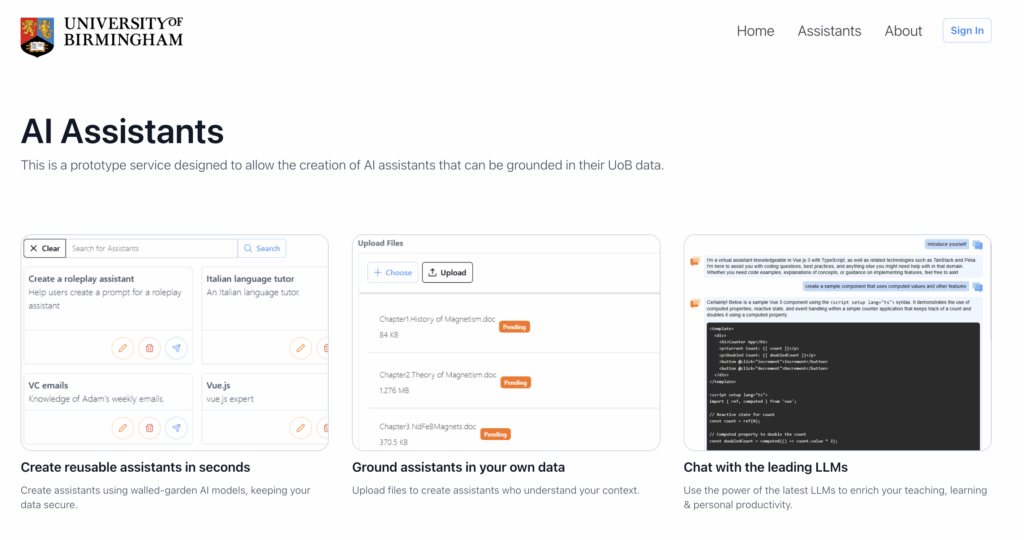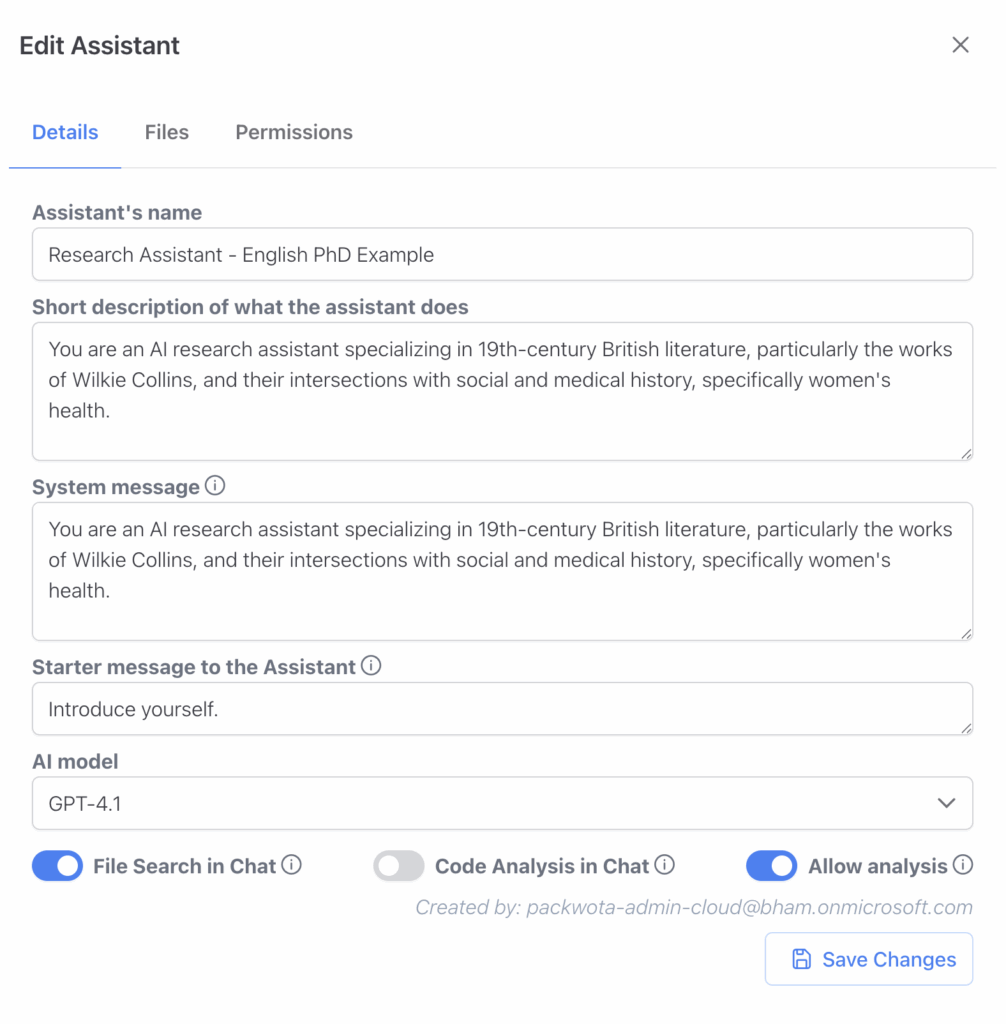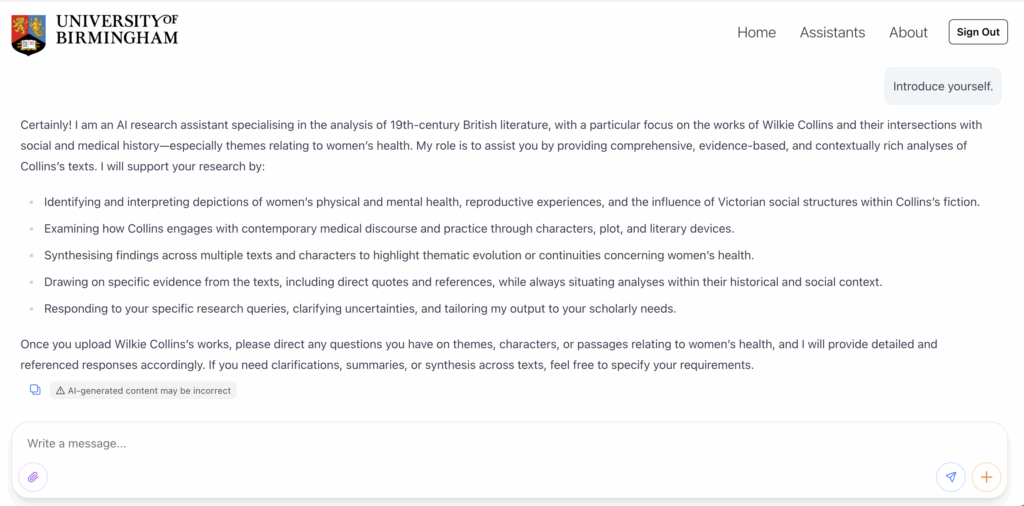We all know Generative AI (GenAI) tools like Microsoft Copilot, Google Gemini, and OpenAI’s ChatGPT are changing how we approach work. Many of us are already using them for a multitude of work functions, such as summarising documents, replying to emails and automating tasks. They’re powerful and they are improving all the time.

But these off-the-shelf tools have their limits, especially in a complex environment like a university. Their knowledge is often confined to their training data – meaning they can be out-of-date or, as we’ve all heard, prone to “hallucinations” (confidently generating incorrect facts!). Crucially, they lack real-time access to our specific university policies, internal data, or nuanced domain knowledge, which can really hinder their reliability for academic, operational, and research tasks.
The Problem with ‘Generic’ AI – And Our Solution
Currently, most GenAI interfaces are generic, relying solely on your prompt to give them context. But what if we could give them a bit of our university’s ‘brain’? Imagine an AI that understands our unique procedures, our specific research areas, or even the intricacies of a particular module.
That’s exactly what the IT Innovation team has been exploring. We’re looking at how to give these tools specific personas (like a friendly tutor or a supportive team member) and, more importantly, how to integrate our own university data to make their outputs far more accurate and applicable.
Enter RAG: Giving AI a Smarter Memory
Our solution hinges on a technique called Retrieval-Augmented Generation (RAG). Don’t worry about the jargon – think of it like this:
Before an AI assistant tries to answer your question, RAG first retrieves highly relevant information from our own trusted knowledge bases (like databases, policy documents, or even specific Canvas course content). It then uses that retrieved information to augment your original query, allowing the AI to generate a response that’s more accurate, up-to-date, and grounded in our reality. It significantly mitigates those frustrating “hallucinations” and knowledge gaps.
Your Custom AI Assistant: A Proof-of-Concept Platform
The IT Innovation team has developed a proof-of-concept platform that makes leveraging RAG surprisingly straightforward. We’ve created a simple-to-use interface that allows you to configure your very own, customised AI chat assistant, using completely private LLMs.
Here’s how easy it is:
- Provide Context: Give your assistant a persona and purpose.
- Integrate Your Data: Upload relevant files, documents, or link to specific knowledge bases.
- Choose Your LLM: Select from a range of underlying Large Language Models (LLMs) to power your assistant, with flexibility to switch if needed.

In just a few minutes, the platform automatically generates a secure chat interface (just like ChatGPT or Gemini), ready to be shared with your colleagues. All accessed safely using your standard university login and multi-factor authentication.

Real-World Impact: Pilot Examples.
During our pilot phase, we created and demonstrated several exciting examples:
- Professional Services Assistant: Imagine an AI agent instantly reviewing information and answering intricate questions pertinent to a wide range of university professional services. This could streamline processes, ensure accuracy, and free up staff for more complex tasks across various departmental functions.
- Niche Research & Analysis Assistant: An AI expert trained specifically in a highly niche field. It could rapidly provide specialist knowledge, accelerate information synthesis, and offer fresh perspectives on complex, data-rich topics for researchers and analysts.
- Personalised Learning & Development Assistant: A highly knowledgeable and patient guide for individuals acquiring new skills or mastering complex subjects, providing tailored explanations for a more engaging and effective learning experience.
These examples sparked some future questions about the future of AI at our university:
- Could AI assistants become a core teaching resource, with students interacting weekly with an AI trained by an academic on specific Canvas content?
- Could AI assistants significantly save academic time and support our growing student cohorts?
- Could we offer a dedicated AI assistant to every PhD researcher as a new, powerful analytical tool?
- Could professional services staff spin up and retire assistants quickly for specific, short-term tasks?
- Could this tool promote the use of more sustainable and less energy-intensive ‘mini’ LLMs for specific use cases?
- What other creative uses could we find for short-lived, highly focused AI assistants?
What’s Next? Scaling Up!
Our pilot with academic and professional services staff yielded overwhelmingly positive feedback. Users truly valued the concept of creating time-bound, customised, context-aware AI chat interfaces integrated with our high-quality, university-specific information.
Since our pilot concluded, several commercial products with similar features have become available. Having successfully proved the concept and value, we’ve decided to invest in and pilot one of these new commercially available platforms. This strategic move will enable the rapid deployment of a wider pilot with even more robust features and capabilities across the university.
We’re excited about the potential of these customised AI assistants to truly transform how we work, learn, and research here at the university.
